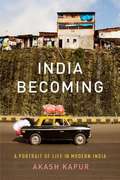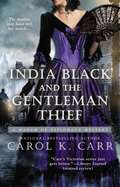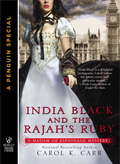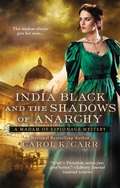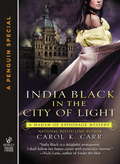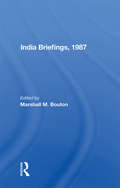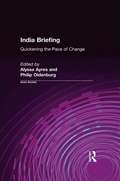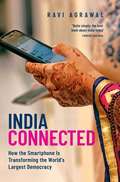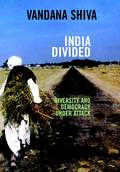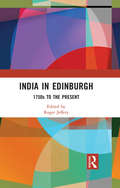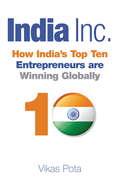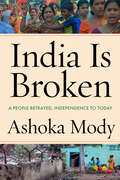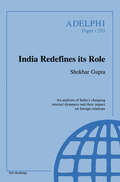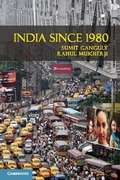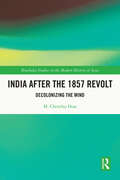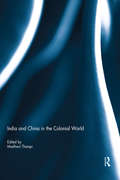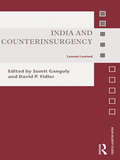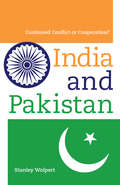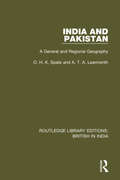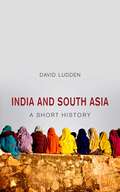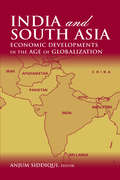- Table View
- List View
India Becoming: A Portrait of Life in Modern India
by Akash KapurA New Republic Editors' and Writers' Pick 2012 A New Yorker Contributors' Pick 2012 A portrait of incredible change and economic development, of social and national transformation told through individual lives The son of an Indian father and an American mother, Akash Kapur spent his formative years in India and his early adulthood in the United States. In 2003, he returned to his birth country for good, eager to be part of its exciting growth and modernization. What he found was a nation even more transformed than he had imagined, where the changes were fundamentally altering Indian society, for better and sometimes for worse. To further understand these changes, he sought out the Indians experiencing them firsthand. The result is a rich tapestry of lives being altered by economic development, and a fascinating insider's look at many of the most important forces shaping our world today. Much has been written about the rise of Asia and a rebalancing of the global economy, but rarely does one encounter these big stories with the level of nuance and detail that Kapur gives us in India Becoming. Among the characters we meet are a broker of cows who must adapt his trade to a modernizing economy; a female call center employee whose relatives worry about her values in the city; a feudal landowner who must accept that he will not pass his way of life down to his children; and a career woman who wishes she could "outsource" having a baby. Through these stories and many others, Kapur provides a fuller understanding of the complexity and often contradictory nature of modern India. India Becoming is particularly noteworthy for its emphasis on rural India-a region often neglected in writing about the country, though 70 percent of the population still lives there. In scenes reminiscent of R. K. Narayan's classic works on the Indian countryside, Kapur builds intimate portraits of farmers, fishermen, and entire villages whose ancient ways of life are crumbling, giving way to an uncertain future that is at once frightening and full of promise. Kapur himself grew up in rural India; his descriptions of change and modernization are infused with a profound-at times deeply poignant- firsthand understanding of the loss that must accompany all development and progress. India Becoming is essential reading for anyone interested in our changing world and the newly emerging global order. It is a riveting narrative that puts the personal into a broad, relevant and revelational context. .
India Before Europe
by Catherine B. Asher Cynthia TalbotIndia is a land of enormous diversity. Cross-cultural influences are everywhere in evidence, in the food people eat, the clothes they wear, and in the places they worship. This was ever the case, and at no time more so than in the India that existed from 1200 to 1750, before the European intervention. This beautifully illustrated book takes the reader on a journey across the political, religious and cultural landscapes of medieval India. It is fluently composed, with a cast of characters that will educate students and general readers alike.
India Black and the Gentleman Thief
by Carol K. CarrIndia Black's double life operating a high-class brothel and running high-stakes espionage for Her Majesty's government can take its toll. But there's no rest for the weary--particularly when an international conspiracy comes knocking... India Black is one of Victorian London's most respected madams--not a bloody postmistress. So when Colonel Francis Mayhew forwards a seemingly innocuous shipping bill to her address, she's puzzled. And when three thugs bust down her door, steal the envelope, and rough up both her and fellow agent French...well, that's enough to make India Black see red. The veteran spies soon discover that Mayhew has been butchered in his own bedroom. An impromptu investigation leads them to London's docks, where India makes a startling discovery she can't bear to tell the rakish French--she has a history with their chief suspect, the gentleman thief who once stole her heart...
India Black and the Rajah's Ruby
by Carol K. CarrIndia Black uses her wit and wiles as both a madam and a spy, proving she's the best there is when it comes to undercover work... Drawn into intrigue by her lover Philip Barrett, India finds herself being used as a pawn to help him steal a valuable jewel. Turning the tables, she proves that India Black answers to no man, no matter how attractive he may be... Includes a preview of India Black and the Shadows of Anarchy
India Black and the Shadows of Anarchy
by Carol K. CarrIn Victorian London, India Black has all the attributes a high-class madam needs to run a successful brothel--wit, beauty, and an ability to lie with a smile. Luckily for Her Majesty's Government, all these talents also make her a first-rate spy... India Black, full-time madam and occasional secret agent, is feeling restless, when one of Disraeli's men calls on her to meet the prime minister--alone. Even though all her previous meetings have been organized by the rakishly handsome spy French, it's been decided this is a mission India must attempt on her own. Revolt has spread across Europe and reached the shores of England--anarchists have begun assassinating lords and earls, one by one. Now India must infiltrate the ranks of the underground group responsible for those attacks, the sinister Dark Legion. To stop their dread plot, India will go from the murkiest slums of London to the highest levels of society, uncovering secrets that threaten her very existence...
India Black in the City of Light (Novella)
by Carol K. CarrWhen it comes to undercover work, nobody does it better than Madam of Espionage India Black... India and the handsome British spy, French, are ordered to escort a Russian agent to Paris where he will be exchanged for one of Her Majesty's operatives. The task seems straightforward and India looks forward to enjoying the delights of the city--and the delights of French. But it isn't long before things go awry and the duo are battling for their lives in the City of Light. Includes a preview of the Madame of Espionage Mystery, India Black and The Gentleman Thief
India Briefing, 1987
by Marshall M. BoutonThis annual review of major events, issues, and trends in Indian affairs presents an authoritative and insightful assessment of India in 1986. Interpretive essays illuminate the causes and consequences of a tumultuous year, as leading specialists discuss Indian politics, economy, society, culture, and foreign relations. The contributors examine such important developments as the breakdown of the Punjab accord, the resurgence of militant communalism, Prime Minister Rajiv Gandhi's faltering leadership, the dramatic heightening of Indo-Pakistan tensions, the growing resistance to economic reforms, and the impact of the video revolution on Indian culture. Filling an important gap in the literature on contemporary Indian affairs, this book will be invaluable for students and scholars of South Asia as well as for journalists, policymakers, businesspeople, and serious travelers who wish to understand current and future developments in India.
India Briefing: 2001 (Asia Society Country Briefing Ser.)
by Philip Oldenburg Alyssa AyresIn the time between 1998 and the publication of this text, India held two national elections and began the second phase of economic reforms. This work examines these political, economic, social and cultural developments in India from 1998 to the end of 2000.
India Calling: An Intimate Portrait Of A Nation's Remaking
by Anand GiridharadasAnand Giridharadas sensed something was afoot as his plane from America prepared to land in Bombay. An elderly passenger looked at him and said, "We're all trying to go that way," pointing to the rear. "You, you're going this way?"Giridharadas was returning to the land of his ancestors, amid an unlikely economic boom. But he was more interested in its cultural upheaval, as a new generation has sought to reconcile old traditions and customs with new ambitions and dreams. In India Calling, he brings to life the people and the dilemmas of India today, through the prism of his émigré family history and his childhood memories of India. He introduces us to entrepreneurs, radicals, industrialists, and religious seekers, but, most of all, to Indian families. Through their stories, and his own, he paints an intimate portrait of a country becoming modern while striving to remain itself.
India Connected: How the Smartphone is Transforming the World's Largest Democracy
by Ravi AgrawalIndia is connecting at a dizzying pace. In 2000, roughly 20 million Indians had access to the internet. In 2017, 465 million were online, with three new people logging on for the first time every second. By 2020, the country's online community is projected to exceed 700 million; more than a billion Indians are expected to be online by 2025. While users in Western countries progressed steadily over the years from dial-up connections on PCs, to broadband access, wireless, and now 4G data on phones, in India most have leapfrogged straight into the digital world with smartphones and affordable data plans. What effect is all this having on the ancient and traditionally rural culture dominated by family and local customs? Ravi Agrawal's book explores that very question, seeking out the nexuses of change and those swept up in them. Smartphones now influence arranged marriages, create an extension of one's social identity that moves beyond caste, bring within reach educational opportunities undreamed of a generation ago, bridge linguistic gaps, provide outlets and opportunities for start-ups, and are helping to move the entire Indian economy from cash- to credit-based. The effects are everywhere, and they are transformative. While they offer immediate access to so much for so many, smartphones are creating no Utopia in a culture still struggling with poverty, illiteracy, corruption, gender inequality, and income disparity. Internet access has provided greater opportunities to women and altered how India's outcasts interact with the world; it has also made pornography readily available and provided an echo chamber for rumor and prejudice. Under a government determined to control content, it has created tensions. And in a climate of hypernationalism, it has fomented violence and even terrorism. The influence of smartphones on the world's largest democracy is pervasive and irreversible, disruptive and creative, unsettling and compelling. Agrawal's fascinating book gives us the people and places reflecting what the internet hath wrought. India Connected reveals both its staggering dimensions and implications, illuminating how it is affecting the progress of progress itself.
India Conquered: Britain's Raj and the Chaos of Empire
by Jon WilsonFor the century and a half before the Second World War, Britain dominated the Indian subcontinent. Britain's East India Company ruled enclaves of land in South Asia for a century and a half before that. For these 300 years, conquerors and governors projected themselves as heroes and improvers. The British public were sold an image of British authority and virtue. But beneath the veneer of pomp and splendour, British rule in India was anxious, fragile and fostered chaos. Britain's Indian empire was built by people who wanted to make enough money to live well back in Britain, to avoid humiliation and danger, to put their narrow professional expertise into practice. The institutions they created, from law courts to railway lines, were designed to protect British power without connecting with the people they ruled. The result was a precarious regime that provided Indian society with no leadership, and which oscillated between paranoid paralysis and occasional moments of extreme violence. The lack of affection between rulers and ruled finally caused the system's collapse. But even after its demise, the Raj lives on in the false idea of the efficacy of centralized, authoritarian power. Indians responded to the peculiar nature of British power by doing things for themselves, creating organisations and movements that created an order and prosperity of its own. India Conquered revises the way we think about nation-building as much as empire, showing how many of the institutions that shaped twentieth century India, Pakistan and Bangladesh were built in response to British power. The result is an engaging story vital for anyone who wants to understand the history of empires and the origins of contemporary South Asian society.
India Divided: Diversity and Democracy Under Attack (Open Media Series)
by Vandana ShivaIn India Divided, environmental, human rights, and antiglobalization activist Vandana Shiva chronicles the internal battles of a nation that is both the world's largest democracy and a leading nuclear power. Shiva describes a society where traditional cultures collide with the new economy of globalization, and charts the course of India's war of fundamentalisms in the age of terror. From the IT centers of Bangalore to the villages of Uttar Pradesh, from the massacre at Gujarat and the popular emergence of Hindutva's narrow communalism to the decades-old battle for Kashmir, India Divided reveals a convergence of globalization and terrorism. Looking to the plights of India's Dalit communities and millions of poor subsistence farmers impoverished or displaced by biotechnology, seed patents, and the spate of mega-dam projects, Shiva argues that these silent killers form a local terror unmatched in devastation. In India Divided Shiva addresses India's most urgent threats with gravity and hope.
India In Edinburgh: 1750s to the Present
by Roger JefferyRoger Jeffery in this book has brought together 10 original, well-researched and well-written essays which bring to life the presence of India in the capital city of Scotland, Edinburgh. On the surface Edinburgh is a purely Scottish city: its ‘India’ past is not easily visible. Yet, from the late 17th century onwards, many of Edinburgh’s young men and women were drawn to India. The city received back money and knowledge, sculpture and paintings, botanical specimens and even skulls! Colonel James Skinner, well-known for establishing Skinner’s Horse, brought his sons to Edinburgh for their schooling. Though Sir Walter Scott visited India only in his imagination (and tried to stop his own sons going there) he crafted a dashing India tale involving Tipu Sultan. The money from India helped create Edinburgh’s New Town, Edinburgh’s internationally-renowned schools (whose former pupils careers ranged from tea-planters to Viceroys) and people who came to Edinburgh from India established Edinburgh’s second women’s medical college. There are many such hidden stories of Edinburgh’s India connections. In this path-breaking book they are brought to life, using novel approaches to look at Edinburgh’s past, to see it as an imperial city, a city for which India held a special place. Focusing on the interactions between individual lives, social networks and financial, material, cultural and social flows, leading experts from Edinburgh’s history provide fascinating detail on how Edinburgh’s links to India were formed and transformed. Please note: Taylor & Francis does not sell or distribute the Hardback in India, Pakistan, Nepal, Bhutan, Bangladesh and Sri Lanka
India Inc.
by Vikas PotaIndia is on its way to giving the world a new generation of role models. India Inc. reveals who makes the list of up-and-coming entrepreneurs and business leaders, and explains what makes them unique. Sifting through jargon, Vikas Pota explains how readers can follow these top earners to create their own success.
India Is Broken: A People Betrayed, Independence to Today
by Ashoka ModyA provocative new account of how India moved relentlessly from its hope-filled founding in 1947 to the dramatic economic and democratic breakdowns of today. When Indian leaders first took control of their government in 1947, they proclaimed the ideals of national unity and secular democracy. Through the first half century of nation-building, leaders could point to uneven but measurable progress on key goals, and after the mid-1980s, dire poverty declined for a few decades, inspiring declarations of victory. But today, a vast majority of Indians live in a state of underemployment and are one crisis away from despair. Public goods—health, education, cities, air and water, and the judiciary—are in woeful condition. And good jobs will remain scarce as long as that is the case. The lack of jobs will further undermine democracy, which will further undermine job creation. India is Broken provides the most persuasive account available of this economic catch-22. Challenging prevailing narratives, Mody contends that successive post-independence leaders, starting with its first Prime Minister, Jawaharlal Nehru, failed to confront India's true economic problems, seeking easy solutions instead. As a popular frustration grew, and corruption in politics became pervasive, India's economic growth relied increasingly on unregulated finance and environmentally destructive construction. The rise of a violent Hindutva has buried all prior norms in civic life and public accountability. Combining statistical data with creative media, such as literature and cinema, to create strong, accessible, people-driven narratives, this book is a meditation on the interplay between democracy and economic progress, with lessons extending far beyond India. Mody proposes a path forward that is fraught with its own peril, but which nevertheless offers something resembling hope.
India Redefines its Role (Adelphi series #293)
by Shekhar GuptaFirst Published in 2005. Routledge is an imprint of Taylor & Francis, an informa company.
India Since 1980
by Rahul Mukherji Šumit GangulyThis book considers the remarkable transformations that have taken place in India since 1980, a period that began with the assassination of the formidable Prime Minister Indira Gandhi. Her death, and that of her son Rajiv seven years later, marked the end of the Nehru-Gandhi era. Although the country remains one of the few democracies in the developing world, many of the policies instigated by these earlier regimes have been swept away to make room for dramatic alterations in the political, economic and social landscape. Sumit Ganguly and Rahul Mukherji, two leading political scientists of South Asia, chart these developments with particular reference to social and political mobilization, the rise of the BJP and its challenge to Nehruvian secularism and the changes to foreign policy that, in combination with its meteoric economic development, have ensured India a significant place on the world stage.
India Under Morley and Minto: Politics Behind Revolution, Repression and Reforms (Routledge Library Editions: British in India #14)
by M.N. DasThe empire which Curzon left late in 1905 was different from what it had been at the close of the nineteenth century when he came to rule over it. After memorable events and political climax, the awakening upset the rulers’ concept of Indian peace. A revolutionary movement, wide in its appeal and full of idealism, generated an incompatibility in the traditional relations between ruler and ruled. This book, first published in 1964 and drawing extensively on the private papers of the main protagonists, examines the years of Indian administration directed by Morley and Minto.
India after the 1857 Revolt: Decolonising the Mind (Routledge Studies in the Modern History of Asia)
by M. Christhu DossWeaving together the varied and complex strands of anti-colonial nationalism into one compact narrative, Christhu Doss takes an incisive look at the deeper and wider historical process of decolonization in India. In India after the 1857 Revolt, Doss brings together some of the most cutting-edge thoughts by challenging the cultural project of colonialism and critically examining the multi-dimensional aspects of decolonization during and after the 1857 revolt. He demonstrates that the deep-rooted popular discontent among the Indian masses followed by the revolt generated a distinctive form of decolonization movement—redemptive nationalism that challenged both the supremacy of the British Raj and the cultural imperatives of the controversial proselytizing missionary agencies. Doss argues that the quests for decolonization (of mind) that got triggered by the revolt were further intensified by the Indocentric national education; the historic Chicago discourse of Swami Vivekananda; the nonviolent anti-colonial struggles of Mahatma Gandhi; the seditious political activism displayed by the Western Gandhian missionary satyagrahis; and the de-Westernization endeavours of the sandwiched Indian Christian nationalists. A compelling read for historians, political scientists and sociologists, it is refreshingly an indispensable guide to all those who are interested in anticolonial struggles and decolonization movements worldwide.
India and China in the Colonial World (Berghahn Ser.)
by Madhavi ThampiIndia and China in the Colonial World brings together thirteen essays by eminent Indian and Chinese scholars as well as young researchers who look at the multidimensional interaction between the two countries. This interaction was of many kinds and took place at various levels. This volume casts new light on some of the problems that have confronted the relations between India and China as new states and, in doing so, challenges stereotyped images of this relationship. The major areas of India-China relationships covered in this book include some aspects of the situation during and after World War II. Some papers, such as those on the importance of Shanghai in Sino-Indian trade, the presence of the Chinese community in India and Indians in China; Indian fighters in the Taiping Rebellion; Gandhi and the Chinese in South Africa; and ties between south-west China and north-east India during World War II; present the findings of new research. Others such as those pertaining to India-China relations in the period, such as the opium trade; the controversial visit of Rabindranath Tagore to China; and the complexity of Subhash Chandra Bose’s position with relation to both China and Japan have been put in a new light. The essays in this book are particularly relevant as they help to understand the relationship between India and China in the context of a historical perspective.
India and Counterinsurgency: Lessons Learned (Asian Security Studies)
by Sumit Ganguly David P. FidlerThis edited volume focuses on India's experiences waging counterinsurgency campaigns since its independence in 1947. Filling a clear gap in the literature, the book traces and assess the origins, evolution and current state of India's counterinsurgency strategies and capabilities, focusing on key counterinsurgency campaigns waged by India within and outside its territory. It also analyzes the development of Indian doctrine on counterinsurgency, and locates this within the overall ebb and flow of India's defense and security policies. The central argument is that counterinsurgency has been an integral part of India's overall security policy and can thereby impart much to political and military leaders in other states. Since its emergence from British colonialism, India's defence policies have not merely sought to protect and preserve India's inherited colonial borders from threats by rival states, but have also sought to prevent and suppress secessionist movements. In countering insurgencies, the Indian state has fashioned strategies that seek to repress militarily any secessionist movement, while simultaneously forging a range of civilian administrative and institutional arrangements that attempt to address the grievances of disaffected populations. The book highlights key strategic and tactical innovations that the Indian Army and security forces made to deal with a range of insurgent movements. Simultaneously, it also examines how the civilian-military nexus enabled India's policy makers to utilize existing, and formulate novel, institutional means to address extant political grievances. India has been most successful where it has managed to use calibrated force, obtained the trust of much of the aggrieved population and made persuasive commitments to political and institutional reform. Examination of these elements of India's counterinsurgency performance can be compared to counterinsurgency doctrine developed by other countries, including the United States, and thus yield comparative policy prescriptions and recommendations that can be applied to other counterinsurgency contexts. This book will be of great interest to students of counterinsurgency and irregular warfare, Indian politics, Asian Security Studies and Strategic Studies in general.
India and Pakistan
by Stanley WolpertBeginning in 1947, when "India and Pakistan were born to conflict," renowned India scholar Stanley Wolpert provides an authoritative, accessible primer on what is potentially the world's most dangerous crisis. He concisely distills sixty-three years of complex history, tracing the roots of the relationship between these two antagonists, explaining the many attempts to resolve their disputes, and assessing the dominant political leaders. While the tragic Partition left many urgent problems, none has been more difficult than the problem over Kashmir, claimed by both India and Pakistan. This intensely divisive issue has triggered two conventional wars, killed some 100,000 Kashmiris, and almost ignited two nuclear wars since 1998, when both India and Pakistan openly emerged as nuclear-weapon states. In addition to providing a comprehensive perspective on the origin and nature of this urgent conflict, Wolpert examines all the proposed solutions and concludes with a road map for a brighter future for South Asia.
India and Pakistan: A General and Regional Geography (Routledge Library Editions: British in India #12)
by O.H.K. Spate A.T.A. LearmonthThis book, first published in 1954 with this revised edition published in 1972, was recognised as the standard work on Indo-Pakistani geography. Part 1 focuses on climate and soils; Part 2 provides a synopsis of the social complexities of the sub-continent; Part 3 examines planning and development; Part 4 is devoted to detailed regional description, both urban and rural.
India and South Asia: A Short History (Short Histories Ser.)
by David LuddenCombining factual information with a critical approach, which probes the nature of culture and identity, this concise yet authoritative account paints a graphic picture of an area stretching from the Indian Ocean to the Himalayan mountains. With coverage not only of India, but also of Nepal, Pakistan, Bangladesh, and Sri Lanka, this book surveys nearly 5,000 years, from the early settlers of prehistory to the assassination of Rajiv Gandhi and the Tamil Tiger conflicts. Particular emphasis is placed on the last 200 years, while the key theme of shifting regional identities underpins its insights into the social, economic, and spiritual past of the region. In the world of globalization that we now inhabit, no world region is understood as being composed simply of enclosed national territories of politics, economy, society, and culture. South Asia is a global phenomenon, and working that knowledge into an understanding of South Asian history is a challenge that this book fully embraces.
India and South Asia: Economic Developments in the Age of Globalization
by Anjum SiddiquiSouth Asia has become a major center of attention on the world stage with the U.S. military involvement in Afghanistan since 9/11, the ongoing concern over Islamic fundamentalism in Pakistan, and India's emergence as a regional economic power. In addition, the age-old problems of South Asia - mass poverty, poor infrastructure, misgovernance, rampant corruption, political uncertainty, and regional wars - add to the increased interest in the region. Incorporating the most current information available, the expert international contributors to this handbook examine the economies and geo-political developments of India, Pakistan, Afghanistan, Nepal, Bangladesh, Sri Lanka, and Bhutan. They focus on three core areas of importance: trade and development in the post-WTO era of globalization; macroeconomic adjustment and economic growth; and poverty, governance, the war on terror, and social indicators. With its cutting edge analysis, the handbook is an essential reference for all students, researchers, and practitioners dealing with the region.
